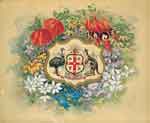 |
| Home | Working Man's Paradise? | Socialist Orator | From Revolutionary To Federal Politician | National Leader | ||
|
BIRTH OF A
NATION There are many reasons why this achievement should be described in this way. There were issues of political autonomy, as none of the states wanted to give up their 'independence' to an unknown central government. Many people felt that to become a nation, Australians had to renounce Britain. This was something they were not prepared to do. Decisions had to be made regarding whom the new nation would include as citizens and who would be given the right to vote. Women, for example, were successful in their petition to have the vote but Aboriginal people were not. There was also widespread debate as to what the powers of a |
national government should be and how they should be exercised. For example, the role of unions and the role of government in industrial arbitration was an issue of intense debate. These were all issues apart from the equally fraught question of who should draw up the Constitution and how that Constitution should be ratified At issue were different ideas about the nature of Australian society, its relationship to indigenous people, neighbouring countries, and Britain as well as ideas about the role of national governments. Embedded within all of these debates were deeply felt reactions to the depression of the 1890s. The nation that was officially brought into being in January 1901 then, was very much the result of all of these pressures. On the day, most people |
rejoiced that they had arrived at a compromise which they could live with and be proud of. That compromise still lives with us today, although some of its principles and the roles of government have changed in response to changing social pressures. Advance Australia, Coat of Arms. c.1901. By permission of the National Library of Australia. |
